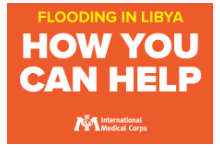On September 10, Storm Daniel made landfall in Libya, bringing strong winds and heavy rainfall to northeastern areas of the country. The next day, two dams upstream of the coastal city of Derna collapsed, releasing 30 million cubic meters of water that ripped through the city of 90,000 inhabitants. This catastrophic event swept entire buildings, with thousands of people still inside them, into the Mediterranean Sea. According to local authorities, one-quarter of the city disappeared. In the flood-affected area, 84% of hospitals and 88% of primary health centers were nonfunctional or only partially functional.
International Medical Corps’ rapid-response team immediately deployed to Derna to conduct an assessment and meet with partners, including staff at one of the few functional hospitals in the city. Government authorities granted our team early access to the area based on our strong relationships and history of effective programming in the country.
As part of our response, we deployed 12 Type 1 EMTs across 30 health facilities in eight municipalities, encompassing Albayada, Albayda, Benghazi, Derna, Misrata, Sousa, Tobruk and Tokra. International Medical Corps is the only international NGO classified by the World Health Organization as an Emergency Medical Team (EMT) Type 1 provider for both Fixed and Mobile configurations.
Since the outbreak of war in Libya in early 2011, the country has faced ongoing economic and political instability, and fighting between violent militias. International Medical Corps provides country-wide emergency medical services, trains health workers and delivers vital medicines and supplies to vulnerable people in the country, including refugees, asylum seekers, internally displaced persons (IDPs) and returnees.
The storm caused significant damage to infrastructure, including roads, telecommunications services, power—and critical healthcare facilities. Humanitarian needs are extraordinarily high in the areas affected by the floods, and include the following:
• support for health services, including medical supplies and equipment, and medical personnel;
• food assistance;
• temporary shelter for people who have had their homes destroyed or rendered uninhabitable;
• non-food items (NFIs) for these displaced families, including tents, blankets, basic household items, hygiene kits, cooking utensils and flashlights;
• mental health services and support for survivors grappling with immense emotional trauma; and
• access of women and girls to safe spaces to support gender-based violence (GBV) prevention and response;
• training for national healthcare providers;
• access to safe water, sanitation and hygiene (WASH) services; and
• rehabilitation of WASH infrastructure in health facilities and installation of community desalination plants.
Your contribution, at any level, is urgently needed and will help provide relief to impacted families.
-----------------------------------------------
Your Support can Save Lives!
By supporting this project or creating a giving opportunity of your own, you can make a lifesaving difference for families affected by crises in Libya and worldwide.
With the support of our global community, in 2023, we:
• reached nearly 16.5 million people affected by armed conflict, natural disasters and disease outbreaks;
• delivered 9,331,598 primary healthcare consultations;
• trained 107,202 people on health, mental health, protection and nutrition-related topics; and
• assisted 2,375,098 people with vital nutrition support.
Join International Medical Corps in our mission to build a healthier and more hopeful world for all in 2024.
-----------------------------------------------
*Please Note for recurring donations: Once we have determined that the community can continue to respond to the after-effects of this emergency without us, we will scale back our response efforts. At that time, we will redirect your future donations where they are needed most, to help us respond to future outbreaks of conflict, disease or disaster.
